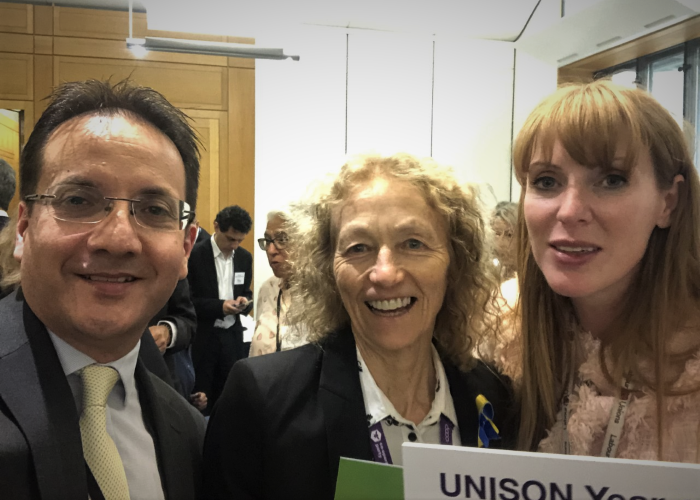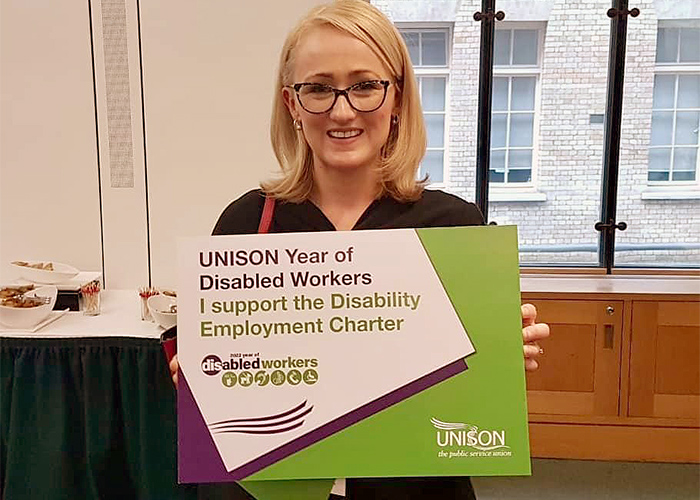
One of the few positives to emerge from the COVID-19 pandemic has been the opportunity for many employees to work from home. Born of necessity during lockdown, workers have found their new working patterns have improved both their productivity and their quality of life.
Of course, not all staff have benefitted equally. Factory and construction workers cannot do their jobs from home. Nor can many of those in the healthcare, retail and leisure industries.
It had been widely assumed that disabled employees would be among the biggest beneficiaries.
Disabled people face intractable environmental and cultural barriers in the labour market. Barely half of disabled people of working age are in employment, compared with over 80 per cent of non-disabled people. This represents a disability employment gap of approximately 30 percentage points, which is compounded by a 14 per cent pay gap (up from about 11.5 per cent in 2014).
At the outset of the pandemic, many hoped that an increase in working from home would improve these outcomes as disabled people would be able to avoid inaccessible transport systems and workplaces. Indeed, many disabled employees who were able to work at home during the pandemic found it to be a positive experience. A poll published by the Trades Union Congress in October 2021 revealed that 90 per cent wanted to continue working from home at least some of the time.
However, assuming that the shift towards home working in the post-pandemic era represents a quick fix to the disadvantage facing disabled workers would be a grave mistake and a distraction from the need for more concerted government action.
This is the conclusion that Nick Bacon, of Bayes Business School, and I reached based on our recent research drawing on nationally representative data from 1,552 workplaces and 14,312 employees within the government-sponsored Workplace Employment Relations Study.
Why won't working from home solve disadvantages for disabled employees?
Our analysis, published in the British Journal of Industrial Relations, found that prior to the pandemic, disabled employees were less likely to work from home than non-disabled employees. Just 12.8 per cent of disabled people stated that in the last 12 months they had either worked from home or that the option to work from home was available to them, compared with 19.3 per cent of non-disabled people. This is not what we would expect if working from home were to benefit disabled people’s employment opportunities.
A key explanation for this disparity was disabled employees’ disproportionate exclusion from the higher-paying or managerial roles in which working from home is more widely available. Even controlling for this, to enable a more like-with-like comparison, we found disabled employees were no more likely to work from home than non-disabled employees.
In addition, we found that while working from home was associated with a more positive in-work experience for both disabled and non-disabled employees, specifically in relation to levels of job control, job-related mental health, job satisfaction, and organisational commitment (but not work-life balance), it was not disproportionately beneficial for disabled employees. As such, it did not narrow the gaps between disabled and non-disabled employees regarding their experience of work.
This suggests that if working from home becomes more widespread following the pandemic, this would not benefit disabled people to a greater extent than non-disabled people. Therefore, it would not reduce disability employment disadvantage.
This in turn raises the question as to why working from home might not have the positive effects for disabled people that have been ascribed to it from some quarters.
One argument is that the anonymity working from home provides might not be to disabled employees’ advantage. It is possible it will reduce the likelihood of barriers being addressed, as well as reducing opportunities to for employees to challenge managers’ unfounded stereotypes concerning disabled people’s productivity.
In addition, where working from home is on a hybrid basis (as has happened increasingly since lockdown ended), disabled people will continue to face barriers regarding inaccessible transport systems on the days they are expected to be in work. Hybrid working also requires employers to provide adjustments in both the home and the work environment. Should they be reluctant to do this, disabled people may face even more inaccessible workplaces than would otherwise have been the case.
Beyond this, working from home can present technological barriers for disabled employees. This might happen, for example, if the employer’s information and communication technologies are incompatible with the assistive technologies disabled employees use at home, or are otherwise inaccessible (e.g., virtual meeting technology without live captioning and non-screen reader-friendly video conferencing software).
Finally, disabled people often experience greater social isolation than non-disabled people. Working from home has the potential to exacerbate this.
What action is required to help disabled workers?
As such, it remains imperative that the government does not assume that any increase in working from home post-pandemic will automatically help solve ongoing disability employment disadvantage.
Instead, the government needs to remain focused on comprehensive policy reform. This has been something for which my Disability@Work academic colleagues and I have been striving for some time.

Caption: Professor Kim Hoque, from Warwick Business School, with Christina Rees MP and Angela Rayner MP, Deputy Leader of the Labour Party, at a Parliamentary event to promote the Disability Employment Charter.
Back in 2016, in collaboration with Disability Rights UK, we published a report for the All Party Parliamentary Group for Disability on how to address the disability employment gap. The numerous meetings we held with government officials to discuss the report’s recommendations resulted in the introduction of apprenticeship targets for disabled people in the 2017 Industrial Strategy White Paper, revisions to government and Conservative Party 2017 and 2019 manifesto disability employment targets, reform of the government’s Disability Confident scheme, and revision of the Public Services (Social Value) Act 2012 regarding the leveraging of public sector procurement to improve disabled people’s employment outcomes.
Not content with these efforts, last year I teamed up with Disability Rights UK; Leonard Cheshire; Scope; the DFN Charitable Foundation; the Shaw Trust Foundation; and UNISON to create the Disability Employment Charter.
This outlines proposals (several of which are underpinned by my research with my Disability@Work colleagues) in nine key areas that we believe the government should implement to address disability employment disadvantage. These include mandatory disability employment and pay gap reporting, reform of the government’s Access to Work and Disability Confident schemes, the leveraging of government procurement, and the advice and support provided to both disabled people and employers.
More than 100 organisations have now signed the Charter, including all of the country’s main disability charities and the British Paralympic Association; large corporates such as McDonalds, Herbert Smith Freehills, PageGroup, Schroders, and the Post Office; and of course, the University of Warwick (which was a founder member). This sends a powerful message to government regarding the extent of appetite for substantive change across a range of key stakeholders, and crucially, consensus regarding what this change should comprise.
We have ensured the government is fully aware of the increasing support for the Charter. Along with the other founder members, I met with Chloe Smith MP (Minister for Disabled People), to discuss the Charter late last year, and she subsequently referred to it in a speech in the Commons as a welcome initiative.
We also held numerous meetings with the Department of Work and Pensions team leading the government’s review of Disability Confident, and the Cabinet Office team leading the consultation on disability workforce reporting, drumming home the message that the growing sign-up to the Charter demonstrates the increasingly voracious call for substantive reform in these areas. WBS is hosting a reception in Parliament in June to promote the Charter among Parliamentarians. Approaching 50 MPs have signed up to attend.

Caption: Rebecca Long-Bailey MP, formerly Shadow Secretary of State for Business, shows her support for the Disability Employment Charter.
In addition, the government’s recent announcement of an £18 million package to help develop supported internships was negotiated in part drawing on support from the Charter.
Disabled people have been denied the same employment opportunities as the wider population for far too long. Working from home will not present a quick fix to this.
The time has come for substantive new government measures, as outlined in the Disability Employment Charter, to address the disadvantage disabled people continue to face in the workplace.
Further information on the Disability Employment Charter, including how to become a signatory, can be found at www.disabilityemploymentcharter.org.
Research with impact
Kim Hoque is Professor of Human Resource Management at Warwick Business School.
His research on disability employment and work with the All Parliamentary Party Group (APPG) on Disability has changed UK Government policies relating to 7.9 million working-age disabled people. This includes the Industrial Strategy White Paper, the reform of Disability Confident and the revision of the Public Services Act.
He teaches Equality and Diversity on the BSc Management, BSc International Management, and BSc Accounting and Finance.
Further reading
Bacon, N., and Hoque, K. (2022) "The treatment of disabled individuals in small, medium-sized, and large firms", Human Resource Management, 61, 2, 137-156
Jones, M., Hoque, K., Wass, V., and Bacon, N. (2021) "Inequality and the economic cycle: disabled employee's experience of work during the great recession in Britain", British Journal of Industrial Relations, 59, 3, 788-815
Hoque, K., and Bacon, N. (2021) "Working from home and disabled people's employment outcomes", British Journal of Industrial Relations, 60, 32-56
For more articles on the Future of Work sign up to Core Insights here.




 X
X Facebook
Facebook LinkedIn
LinkedIn YouTube
YouTube Instagram
Instagram Tiktok
Tiktok